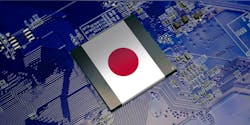Japan Gov't Backs Major Firms in Next-Gen Chip Project
Japan will pour half a billion dollars into a new project to develop and make next-generation microchips, the government said Friday, as the global shortage of semiconductors sparks economic security concerns.
Eight major companies including Sony, SoftBank, Toyota and telecoms giant NTT have joined forces for the venture, the industry ministry said.
Named Rapidus, the new firm says it aims to mass-produce next-generation semiconductors by 2027.
The pandemic has fueled a global shortage of semiconductors, an essential component of nearly all modern electronics, from smartphones to kitchen appliances and cars.
This has forced businesses to slow manufacturing activity, and has prompted calls for governments and firms to secure chip supplies as geopolitics become increasingly volatile -- especially concerning Taiwan, which has a huge chip-producing capacity.
Japan's industry ministry said each company has invested around one billion yen ($7 million) in Rapidus, with MUFG Bank investing 300 million yen.
On top of this, the government has said it will grant 70 billion yen to the project.
At an unveiling of the new venture, Rapidus president Atsuyoshi Koike said economic security issues were "very problematic considering the global supply chain," with many chipmakers based in China and Taiwan.
"It seems that everyone has come to understand the importance of semiconductors in recent years," Koike told reporters, adding that "there has also been growing concern about the decline of the Japanese semiconductor industry."
U.S. officials have posited that the world is closer than ever to seeing a conflict over Taiwan, which China considers its own territory, to be taken one day, by force if necessary.
Given Taiwan is the top player in the semiconductor world, any move to invade would wreak havoc with global supply chains.
Washington recently introduced new measures to limit China's access to high-end semiconductors with military uses, a move that has wiped billions from chip companies' valuations worldwide.
The German economy ministry also has recommended that the sale of a chip factory to a Chinese-owned firm should be blocked as it poses a security threat, government sources said Tuesday.
Last year, Taiwanese chip giant TSMC and Sony said they would tie up on a new $7 billion plant in Japan.
Copyright 2022, Agence France-Presse
About the Author
Agence France-Presse
Copyright Agence France-Presse, 2002-2025. AFP text, photos, graphics and logos shall not be reproduced, published, broadcast, rewritten for broadcast or publication or redistributed directly or indirectly in any medium. AFP shall not be held liable for any delays, inaccuracies, errors or omissions in any AFP content, or for any actions taken in consequence.
